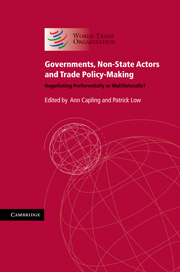Book contents
- Frontmatter
- Contents
- List of figures and tables
- List of contributors
- Acknowledgements
- Disclaimer
- Introduction
- 1 The domestic politics of trade policy-making: state and non-state actor interactions and forum choice
- 2 Chile
- 3 Colombia
- 4 Mexico
- 5 Indonesia
- 6 Thailand
- 7 Jordan
- 8 Kenya
- 9 South Africa
- 10 The influence of international non-state actors in multilateral and preferential trade agreements: a question of forum shopping?
- 11 Main findings and conclusions
- Index
- References
2 - Chile
Published online by Cambridge University Press: 05 July 2014
- Frontmatter
- Contents
- List of figures and tables
- List of contributors
- Acknowledgements
- Disclaimer
- Introduction
- 1 The domestic politics of trade policy-making: state and non-state actor interactions and forum choice
- 2 Chile
- 3 Colombia
- 4 Mexico
- 5 Indonesia
- 6 Thailand
- 7 Jordan
- 8 Kenya
- 9 South Africa
- 10 The influence of international non-state actors in multilateral and preferential trade agreements: a question of forum shopping?
- 11 Main findings and conclusions
- Index
- References
Summary
This chapter reviews the participation of non-state actors (NSAs) in trade policy and negotiations in Chile over the last two decades, following democratic restoration in 1990. The analysis focuses on three main types of NSAs: business associations; labour organizations; and civil society organizations (CSOs). Most information has been gathered through structured interviews with NSA representatives and current and former government officials (see the list in the Annex below). The existing literature has been used as a secondary source.
The chapter is structured as follows: section 1 presents an overview of Chilean trade policy since the 1930s and a description of the country’s trade patterns; section 2 describes Chile’s main actors in trade policy; section 3 contains an analysis of NSA participation in a number of specific trade negotiations; and section 4 presents the study’s main findings and conclusions.
The main findings that emerge from the chapter are the following. First, the intensive process of trade negotiations which started in 1990 has been dominated from the outset by the executive branch of government. Second, the business sector is by far the most influential constituency among NSAs. Third, NSA participation in trade debates (with the exception of the business sector) has been rather sporadic, and decreased significantly after major negotiations with the United States and the European Union were completed in 2003. Fourth, the relatively strong support for ‘free trade’ that exists within business and political elites as well as among the Chilean population at large means that those NSAs critical of trade negotiations have played a mostly marginal role.
- Type
- Chapter
- Information
- Governments, Non-State Actors and Trade Policy-MakingNegotiating Preferentially or Multilaterally?, pp. 29 - 62Publisher: Cambridge University PressPrint publication year: 2010

